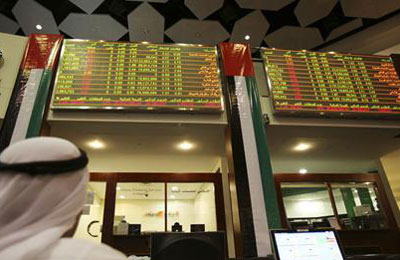
Foreign funds lift Dubai to 34-month high
Dubai, January 29, 2013
Dubai's index hit a 34-month high on Tuesday as foreign investors bought into the emirate's economic recovery, while Egypt's bourse slumped to a 2013 low after the army said political strife was pushing the state to the brink of collapse.
In Dubai, bluechips led gains. Emaar Properties climbed 3.7 percent and top bank Emirates NBD (ENBD) surged 8.6 percent to a 15-month high.
Du, Dubai's third largest stock by market value after Emaar and ENBD, slipped 0.6 percent. The telecom operator's shares are off-limits to foreign institutions.
"People have realised there is economic recovery in Dubai and at the same time we have more and more foreign money that wants to invest in emerging and frontier markets," said Sebastien Henin, portfolio manager at The National Investor.
"For the first time in ages, we have smart money moving into the region - this is targeting the bluechips and in Dubai and Abu Dhabi you don't have so many quality names, so they are targeting Emaar, Air Arabia and Emirates NBD."
Foreign funds are wary of buying Abu Dhabi stocks because of uncertainty over the UAE capital's property sector, Henin said.
"There's more confidence in the revival of Dubai," he said.
Passenger flows through Dubai's main airport rose 13.2 percent in 2012, a bullish indicator for the tourism sector, which is vital for the emirate's economy.
Dubai slid into recession in 2009 as a property bubble burst, but is now recovering, although it faces nearly $50 billion of debt maturities between 2014 and 2016, according to a Standard Chartered report in November.
Dubai's index climbed 1.8 percent to its highest close since April 2010, although it remains 71 percent below a 2008 peak.
"The rally has been very strong - we should expect profit taking in the coming days or weeks, but the recovery story will still be intact," said Henin. "I don't think investors are buying for Q4 results - they have a long-term view."
Egypt's main share index dropped 2 percent to its lowest finish since Dec. 31. It has fallen 3.4 percent in two sessions since the government declared a state of emergency in three cities on the Suez Canal.
The Army head on Tuesday said one of the main goals of deploying troops was to protect the waterway that is crucial to Egypt's economy and world trade.
"The chaos in the country now makes it imperative for the market to go down - how can we invest in a country with no security?" said Nader Ibrahim, managing director at Archer Consulting in Cairo. "Neither the president nor the opposition can control the streets."
Property developer Palm Hills, which fell 1.7 percent, is the most active stock, accounting for nearly a fifth of all shares changing hands on the main benchmark.
In Oman, Bank Muscat rose 1.5 percent to a nine-month high after it proposed a 40 percent dividend.
Three of the four most traded stocks were banks - Bank Muscat, plus Bank Nizwa, which rose 0.9 percent, and Bank Sohar, which fell 0.6 percent.
"Foreign investors like Bank Muscat's dividend and it triggered huge buying in the stock and others such as Bank Sohar and Bank Nizwa," said Adel Nasr, United Securities brokerage manager. "There's positive momentum in the market - results have been pretty good and government spending will help listed companies perform better. It's a promising year unless something happens politically - from a fundamental point of view we're in good shape." - Reuters







